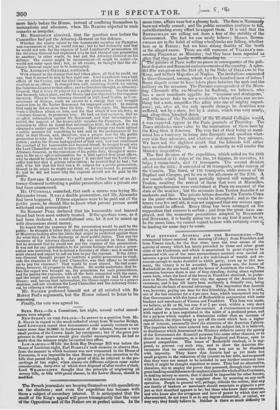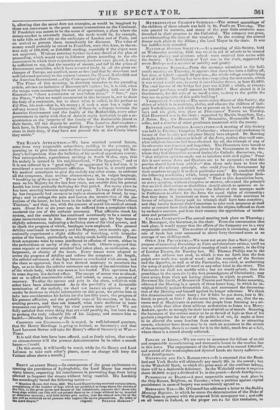WAtt BETWEEN AUSTRIA AND THE ROTHSCHILDS.—The commercial letters received this
morning (Friday) from Frankfort and from Vienna touch, for the first time, upon the true causes of the scarcity of money which has lately prevailed in those and other great cities of the Continent, and which is ascertained in great degree to be connected with one of the most extraordinary contests ever carried on between a great Government and a few individuals of wealth and resources enough to make doubtful to which party, even up to this moment, the victory is to be awarded. The parties are, the house of Rothschild on the one hand, and the house of Austria on the other. The connexion between them is one of long standing, dating about eighteen years back, when the head of the house at Frankfort obtained, in preference to Messrs. Bethman of that city, the agency of the Austrian Government, and it has till lately been uniformly a friendly one, being founded on thebasis of mutual advantage. The impression that Austria was, however, paying too dear for this friendship, first arose, it is said, out of the last contract for a 4 per cent. loan, which was entered into by that Government with the house of Rothschild in conjunction with some bankers and merchants of Vienna and Frankfort. This loan was made, we believe, at 85 or 86, but rose 6 or 7 per cent. within a very short period after the conclusion of the contract. A circumstance so unusual with regard to a loan negotiated in the midst of a profound peace, and for a purpose which implied a diminution rather than an increase of expenditure, the object being to pay off the stock which bore a higher rate of interest, necessarily drew the attention of the Austrian Cabinet. The inquiries which were entered into on the subject led, it is believed, to disclosures which determined the Ministry either to carrry the agency of the Government for financial purposes into some other channel, or to throw its money contracts, as is done by England and France, open to general competition. The house of Rothschild resolved, it is supposed, to prevent any such step, and to show the Austrian Government that its connexion with them was not to be dissolved with impunity. They knew that Austria had as yet made but small progress in the reduction of the interest on her debt, and suspected that they were not meant to be included in any further contracts into which it might be thought expedient to enter. They had no alternative, therefore, but to employ the power they possessed, through their various greatbankingestablishments throughout almost the whole ofthe Continent, in making money so scarce, that it should be impossible for other houses, with less extensive means, to supplant them by entering on any such operation. People in general will, perhaps, ridicule the notion, that any one family of bankers or merchants should entertain so gigantic a project as that described appears to be; but those who know their resources, and who know also the arrogance and love of power by which they are characterized, de not treat it as in any degree chimerical; or rather, we may say, they firmly believe it. Neither is there so much difficulty in it, allowing that the secret does not transpire, as would be imagined by those not conversant in the great money transactions on the Continent. If Frankfort was meant to be the scene of operations, a place where the money-market is extremely limited, the mode would be, for example, to take bills on that city on the exchanges of London and of Paris, and on arrival to present them immediately for discount. The value of money would probably be raised in Frankfort, were this done, to the extent only of 100,000/, or 200,000/. sterling, especially if the object were not suspected. Without entering further into any detail of the plan of proceeding, which would vary in different places according to the circumstances in which their respective money.markets were placed, it may be sufficient to say, that the scarcity of money, and fall in the prices of Government securities, which have occurred lately in all the great exchanges of Europe, are ascribed, more or less (and that by observant and well-informed persons) to the contest between the Messrs. Rothschild and the Austrian Governments--City Correspondent of the Times. The Times of this morning, in directing attention to the preceding article, advises an imitation of Buonaparte's tactics : he, it is said, when the troops were murmuring for want of proper supplies, told one of his Generals to "shoot a contractor or two before them." " Noe'," says the Times," what we would recommend in this instance is, not to shoot the body of a contractor, but to shoot what is called, in the preface to Gil Bias, his soul—that is, his money ; if such a man has a right to call any money his. Unquestionably, if there be a dispute between the Austrian Government and the family of the Rothschilds, every other government in amity with. that of Austria ought forthwith to put a sequestration on the property of the family of the Rothschilds placed in their funds, till the dispute be settled. The Austrian Ambassadors— both here, in France, and throughout Europe—have been greatly deficient in their duty, if they have not pressed this at the Courts where they reside."



























 Previous page
Previous page